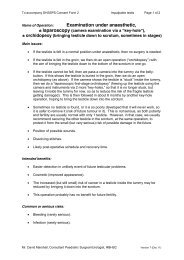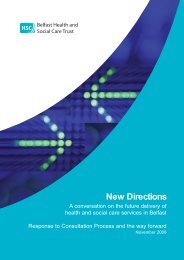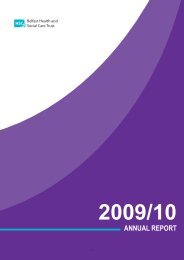An Outline Guide
An Outline Guide
An Outline Guide
- No tags were found...
You also want an ePaper? Increase the reach of your titles
YUMPU automatically turns print PDFs into web optimized ePapers that Google loves.
Contents1. Introduction 22. Leadership and Commitment 33. Northern Ireland Act 1998 – scope of the legislation 54. What are Public Authorities required to do?Statutory requirements and Commission advice 81
Leadership and CommitmentSection 75 was intended to be transformative. Its aim was to change thepractices of government and public authorities so that equality ofopportunity and good relations are central to policy making, policyimplementation, policy review and service delivery.The Section 75 statutory duties aim to encourage public authorities toaddress inequalities and demonstrate measurable positive impact on thelives of people experiencing inequalities. Its effective implementationshould improve the quality of life for all of the people of Northern Ireland.Leadership and commitment provided at the highest levels in a publicauthority, for example, Minister and Permanent Secretary or Chair andChief Executive are critical to the successful achievement of the intendedoutcomes of Section 75.Effective implementation of the Section 75 statutory duties can be attainedif there is ongoing top-level commitment within public authorities to:• The production of an effective equality scheme, that conforms to theCommission’s <strong>Guide</strong>.• The allocation of necessary resources, establishment of clear lines ofresponsibility, effective communication and training, and a system orsystems for monitoring and ensuring progress.• Mainstreaming of the Section 75 statutory duties through the evaluation ofall policies at all levels and at all stages, for their likely impact on thepromotion of equality of opportunity and good relations, using the triedand tested tools of screening and equality impact assessment (EQIA). 44 For further information on Mainstreaming see ECNI, the <strong>Guide</strong>, Pages 8-9 and 86.3
• Undertaking an audit of inequalities which is relevant to the publicauthority’s functions and developing action measures / action plans thatcontribute to addressing these inequalities.• The discharge of both of the Section 75 (1) and (2) duties to promoteequality of opportunity and good relations. The promotion of equality ofopportunity and good relations entails more than the elimination ofdiscrimination. It requires public authorities to seek out opportunities topromote equality of opportunity and good relations and may requiretaking proactive measures.The Commission’s Section 75 Effectiveness Review found that publicauthorities have focussed mainly on the equality of opportunity duty. It isvital that public authorities also focus on the good relations duty as it too isa legal requirement.Commitment by leaders of public authorities to all of the requirements andrecommendations of the revised <strong>Guide</strong>, outlined in this summarydocument, should have a real and tangible impact on reducing inequalitiesthat exist for people within Northern Ireland.4
Northern Ireland Act 1998– scope of the legislationSection 75 Statutory DutiesSection 75 of the Northern Ireland Act 1998 (the Act) requires publicauthorities designated 5 for the purposes of the Act to comply with twostatutory duties.(1) A public authority shall in carrying out its functions relating toNorthern Ireland have due regard to the need to promote equality ofopportunity-(a)(b)(c)(d)between persons of different religious belief, political opinion,racial group, age, marital status or sexual orientation;between men and women generally;between persons with a disability and persons without; andbetween persons with dependants and persons without.The promotion of equality of opportunity entails more than the elimination ofdiscrimination. It requires proactive action to promote equality ofopportunity between the categories identified in Section 75 (1).The equality duty encourages a public authority to take action to addressinequality among the specified groups.5 ECNI, the <strong>Guide</strong>, Chapter 5, page 26.5
(2) Without prejudice to its obligations under subsection (1), a publicauthority shall in carrying out its functions relating to Northern Irelandhave regard to the desirability of promoting good relations betweenpersons of different religious belief, political opinion or racial group.The Commission emphasises that the good relations duty embraces andextends beyond the religious / political dimension of ‘community relations’.Consideration of the needs and interests of all minority ethnic groups isalso important in this context.Due regard and Regard 6Having ‘due regard’ and ‘regard’ means that the weight given to the need topromote equality of opportunity and good relations is proportionate to therelevance of the particular duty, to any function of a public authority.Therefore, having ‘due regard’ or ‘regard’ entails taking a proportionateapproach in determining the relevance of equality of opportunity and / orgood relations to a particular function or policy.Relationship between the Section 75 (1) and (2) dutiesThe term ‘due regard’ was intended to be, and is, stronger than ‘regard’,but in either case an authority is required by the Act to take them intoaccount and give them the required weight when carrying out its functionsrelating to Northern Ireland. Recognition of the inter-dependence ofequality and good relations is crucial.6 ECNI, the <strong>Guide</strong>, Chapter 5, Page 27.6
Both duties always apply. Where a public authority may perceive a tensionbetween the two duties, it should be noted that both duties have to bedischarged in all circumstances. What Section 75 provides is that thedischarge of the good relations duty cannot be an alternative to or cannotset aside the equality of opportunity duty.Schedule 9Schedule 9 of the Northern Ireland Act 1998 sets out a range ofrequirements, on public authorities, to give effect to the duties underSection 75. In particular it requires that public authorities develop anequality scheme which details how they propose to fulfil the duties imposedby Section 75 in relation to their relevant functions.7
What are Public Authoritiesrequired to do?Statutory requirementsand Commission advicePublic authorities in carrying out their functions relating to Northern Irelandare required by the Section 75 statutory duties, to have due regard to theneed to promote equality of opportunity between the nine equalitycategories and have regard to the desirability of promoting good relationsbetween persons of different religious belief, political opinion or racialgroup.To implement the Section 75 statutory duties, designated public authoritiesare required to prepare and submit an equality scheme 7 which conforms toCommission guidance (the <strong>Guide</strong>). <strong>An</strong> equality scheme is a statement ofthe public authority’s commitment to fulfilling its Section 75 statutory duties.The equality scheme is an important written document which must besubmitted to and approved by the Commission.The Commission is of the view that the following statutory requirementsand statutory advice should be incorporated into a public authority’sequality scheme to ensure the effective discharge of the Section 75statutory duties.7 ECNI, The <strong>Guide</strong>, Chapter 6, Page 32.8
The public authority’s arrangements for assessing its compliancewith the Section 75 statutory duties and for consulting on mattersrelevant to the duties;This section of an equality scheme must include how a public authorityintends to assess its compliance with the Section 75 statutory dutiesand details of arrangements for consultation. The legislation requiresconsultation on the equality scheme itself, on the impact of policies and onmatters to which the Section 75 statutory duties are likely to be relevant.The Commission recommends that a public authority commits to consultwith people directly affected by any policy to be assessed and thatconsultations will be conducted in accordance with the consultationrecommendations detailed in Chapter 7 of the Commission’s <strong>Guide</strong>,including a consultation period of 12 weeks.The Commission recommends that an equality scheme includes a generalintroductory statement, including a specific statement of leadershipcommitment to the Section 75 statutory duties e.g. allocation of necessaryresources in terms of people, time and money, to the Section 75 statutoryduties and that this is signed off at the most senior level within the publicauthority.<strong>An</strong> outline of internal arrangements should also be included in the equalityscheme. It is important that a public authority designates primaryresponsibility for the duties to a specific senior member of staff, operatingat Board level, with clear lines of responsibility throughout the organisation,to ensure accountability.The Commission also recommends that public authorities include in theirequality scheme a commitment to developing action measures / actionplans, relative to the functions of the public authority, detailing actions topromote equality of opportunity and good relations.9
Action measures / action plans should be developed in parallel to themainstreaming of the Section 75 duties through the evaluation of allpolicies using the tools of screening and EQIA. Action plans should outlinethe desired outcomes, for the Section 75 equality and good relationscategories, a public authority aims to achieve with related performanceindicators and timescales.Further guidance on the development of action measures / action plans isoutlined in Chapter 8 of the <strong>Guide</strong>. One of the key steps in relation to thedevelopment of action measures / action plans is to provide an evidencebase by undertaking an audit of inequalities i.e. a systematic review andanalysis of inequalities which exist for service users and those affected bya public authority’s functions.The Commission recommends that public authorities should include in theirequality scheme a commitment to conducting an annual review of progress,by the 31 August each year, on the implementation of their equalityscheme, including progress on delivery of actions they have identified topromote equality of opportunity and good relations. This will assist leadersin organisations to assess their organistion’s progress in relation to theSection 75 Statutory Duties.The public authority’s arrangements for assessing and consultingon the likely impact of policies on the promotion of equality ofopportunity;Public authorities are required by the legislation to assess and consult onthe likely impact of their policies on the promotion of equality of opportunity.<strong>An</strong> equality scheme must specify how the public authority is going toassess the likely impact of policies on the promotion of equality ofopportunity and how they will consult on the likely impact of policies.10
The Commission recommends screening 8 and equality impact assessment 9as tools to be utilised for assessing the likely impact of a policy on thepromotion of equality of opportunity and on good relations and that publicauthorities commit in their equality scheme to using these tried and testedtools. If screening identifies that a policy has a major potential to impact onequality of opportunity and good relations, then it should be subjected to anequality impact assessment.It is important that public authorities, when assessing policies, commit todoing so at the start of the policy development process, rather than whenthe policy has been established. It is also important to remember that theassessment of the policies includes the assessment of any high levelstrategy / policies as well as those developed at other stages ofimplementation.The lead role in the assessment of policies e.g. screening of a policyshould be taken by the policy decision-maker with the authority to makechanges to that policy and a copy of any screening exercise of a policyshould be ‘signed off’ and approved by the senior manager responsiblefor the policy.The public authority’s arrangements for monitoring any adverseimpact of policies on the promotion of equality of opportunity;Public authorities must outline their monitoring arrangements in theirequality scheme. Public authorities must monitor any adverse impact ofpolicies adopted.In addition, the Commission recommends that a public authority makesa commitment to monitoring more broadly than for adverse impacts.Monitoring can assist public authorities to deliver better public servicesand continuous improvements. The Commission recommends that public8 ECNI, the <strong>Guide</strong>, <strong>An</strong>nex1, p51.9 ECNI, Practical Guidance on Equality Impact Assessment (2005).11
authorities monitor policies to identify opportunities to better promoteequality of opportunity and good relations 10 .The public authority’s arrangements for publishing the results ofassessments of policies;<strong>An</strong> equality scheme must state how an authority will publish the results ofassessments and publish the results of monitoring adverse impacts ofpolicies adopted.The public authority’s arrangements for training staff on issuesrelevant to the duties;This section of the equality scheme must state the public authority’sarrangements for the training of staff on both the equality of opportunityand good relations duties.The public authority’s arrangements for ensuring and assessingpublic access to information and to services provided by theauthority;This section of the equality scheme must specify how the authority willensure that both the information which it disseminates and the serviceswhich it provides are made accessible in a way which promotes equalityof opportunity.The public authority’s arrangements for dealing with complaintsarising from a failure to comply with the equality scheme;This section of the equality scheme should detail a procedure for dealingwith complaints including where and how complaints may be raised and atimetable for responding.10 ECNI, Monitoring Guidance for Use by Public Authorities, July 2007.12
The public authority’s timetable for measures proposed in theequality scheme;A timetable of measures proposed within the scheme must be included withinthe scheme.Measures included in a timetable should include training, undertakingassessments of policies, monitoring of policies, consultation and any othermeasures proposed in the equality scheme. The Commission recommendsthat this timetable is linked to a public authority’s corporate plan.Details of how the equality scheme will be published;The equality scheme must be published. This can be done and notified viapress releases, prominent advertisements in the press, the internet anddirect mail shots to groups representing the various Section 75 categories.A commitment to conducting a review of the equality scheme;A public authority must, within five years of submission of an equalityscheme to the Equality Commission, review the equality scheme andsubmit a report of the review to the Equality Commission.A commitment that in making any decision with respect to a policyadopted or proposed to be adopted by it, a public authority shall takeinto account any such assessment and consultation carried out inrelation to the policy;<strong>An</strong> equality scheme must detail the public authority’s commitment that inmaking any decision with respect to a policy, it shall take into account anyassessment and consultation carried out to inform policy development anddecisions.13
Further information and adviceFor further information and advice on equality issues and if you would like to find outmore about the Equality Commission and its work, or if you would like to requestalternative formats of this publication contact us at:Equality Commission for Northern IrelandEquality House7-9 Shaftesbury SquareBelfast BT2 7DPTelephone: 028 90 890 890 (Enquiry Line)Fax: 028 90 315 993Textphone: 028 90 500 589Email: information@equalityni.orgWebsite: www.equalityni.orgFebruary 2012 ISBN 978-1-906414-29-0
















